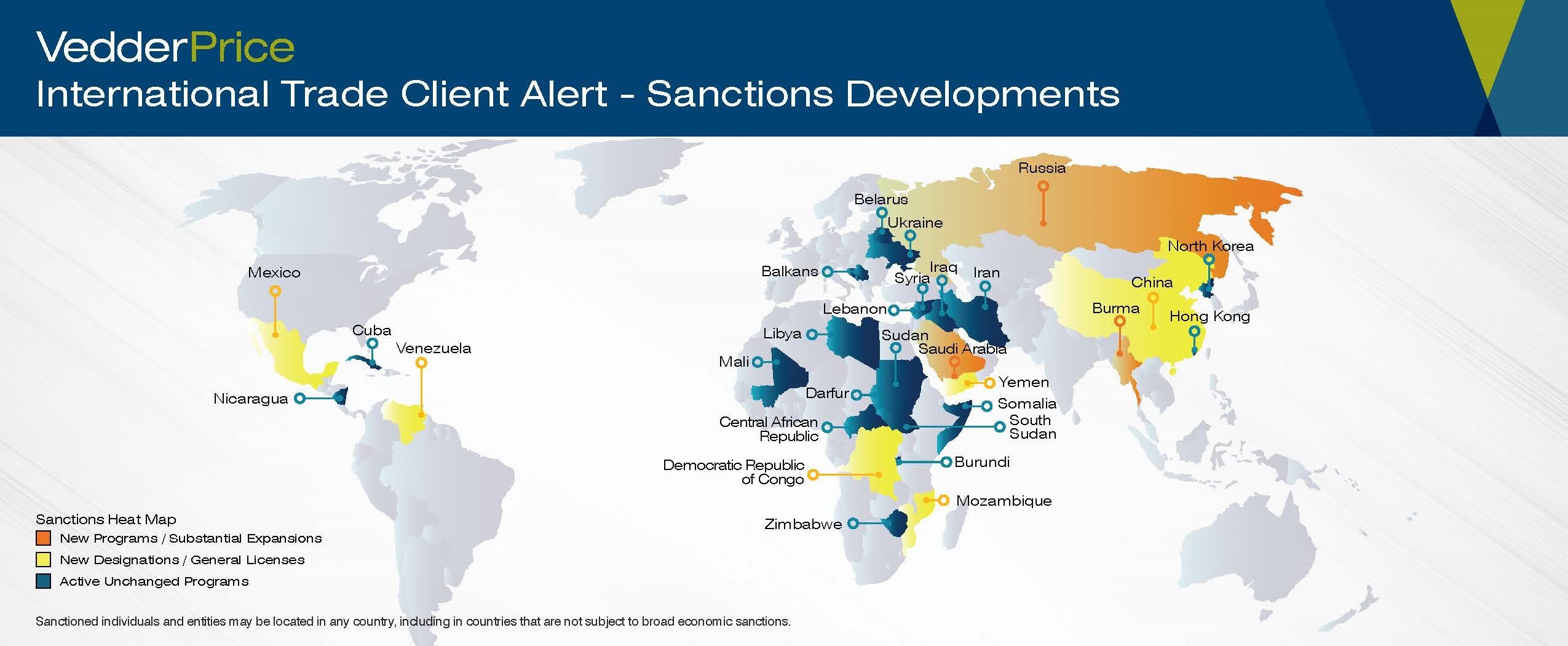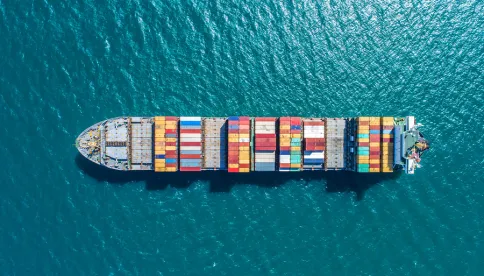Monitoring sanctions developments as a heat map for U.S. foreign policy and national security under the Biden Administration.
As the calendar flipped past the 50th day of President Joe Biden’s administration on March 11, 2021, a survey of economic sanctions and export control-related developments shows where the Administration felt a pressing need to impose new sanctions, alter existing policies or, in several areas, clarify existing programs. To date, we have not seen substantial changes to any ongoing sanctions programs by the Biden Administration, but we will be watching complex hot spots such as China and Iran as the Administration works through the nuances of its foreign policy and deepens its diplomatic efforts over the coming weeks and months. In this bulletin, we share our thinking on these early developments with our clients and friends to help you keep your sanctions programs current and monitor shifting risk levels posed by your international operations.

Africa
Democratic Republic of the Congo and Mozambique
The Biden Administration advanced the long-standing sanctions program against foreign terrorist organizations operating on the African continent with the designation by the Department of State of two affiliates of the Islamic State, one each in the Democratic Republic of Congo and Mozambique, as “foreign terrorist organizations,” adding them to the Office of Foreign Assets Control’s (“OFAC”) Specially Designated Nationals (“SDN”) List and subjecting them to broad sanctions. Allied Democratic Forces (also known as ISIS-DRC (“ADF”)) and Ansar al-Sunna (also known as ISIS-Mozambique) are believed to be responsible for multiple attacks on civilians and government security forces that have killed thousands of people in south and central Africa since 2017.1 The Department of State also designated ISIS-DRC, ISIS-Mozambique, and their leaders Seka Musa Baluku and Abu Yasir Hassan as Specially Designated Global Terrorists under Executive Order 13224. The leader of the ADF, Musa Baluku, as well as five of his ADF associates, previously were designated in December 2019 pursuant to Executive Order 13818 under the Global Magnitsky Human Rights sanctions program for their role leading an organization that has engaged in serious human rights abuses, and they joined a long list of individuals and organizations designated by President George W. Bush under Executive Order 13413 and President Barack Obama under Executive Order 13671 for engaging in armed conflict and widespread human rights abuses. As human rights remain a focus of the Biden Administration globally, additional designations under the Global Magnitsky sanctions program in areas of ongoing conflict in Africa—and wherever else ISIS expands its activities—are likely.
Asia
Myanmar (Burma)-Related Sanctions
President Biden established the first new sanctions program under his Administration on February 10, 2021, with Executive Order 14014, a blocking order targeting the defense sector of the Burmese economy, as well as Burmese military and security forces that were responsible for the February 1, 2021 coup and the brutal attacks against unarmed protesters that ensued.2 Six current and former military officials were designated for being directly involved in the coup.3 Four military officials and two other individuals appointed to the State Administration Council were also designated, together with three Burmese entities owned or controlled by the military or security forces .4 The most recent designations named the two adult children of the Commander-in-Chief of the Burmese military forces as SDNs, as well as six Burmese entities that they own or control.5
In addition to military and security leaders, the new sanctions also apply broadly to the Government of Burma, including the Central Bank of Myanmar, and the Government’s political subdivisions, agencies, instrumentalities, all persons “owned or controlled by, or acting on behalf of, the Government of Burma,” and other individuals who have undermined democratic processes or institutions or committed actions that threaten the peace, security or stability of Burma. 6 In the first 50 days of the Biden Administration, 23 individuals and entities have been designated under this program, and additional designations are likely if political prisoners are not released and the democratically elected government is not restored.7
In a related development, the Commerce Department’s Bureau of Industry and Security (“BIS”) removed Burma from Country Group B and placed it in Country Group D:1, resulting in a more restrictive review of license applications for exports and reexports, and also subjecting Burma to “military end use” and “military end user” restrictions under the Export Administration Regulations (“EAR”). 8 BIS also added four entities to the Entity List. As matters currently stand, transactions requiring a license for the export or re-export of items subject to the EAR when destined for Burma’s Ministry of Defense, Ministry of Home Affairs, armed forces, and security services will be reviewed by BIS under a presumption of denial. 9,10
Communist Chinese Military Companies Sanctions
Under the Administration of President Donald J. Trump, the United States imposed a new sanctions program designed to restrict the increasing militarization of the People’s Republic of China (“PRC”), which poses a threat to the national security of the United States. The Trump Administration initiated the sanctions program with Executive Order 13959 on November 12, 2020, by issuing sanctions designed to prevent U.S. persons from purchasing securities in—and thereby providing financing to—“Communist Chinese military companies”11 appearing on the Non-SDN Communist Chinese Military Companies List (NS-CCMC). Justifying the sanctions, President Trump stated,
“the People’s Republic of China (PRC) is increasingly exploiting United States capital to resource and to enable the development and modernization of its military, intelligence, and other security apparatuses, which continues to allow the PRC to directly threaten the United States homeland and United States forces overseas, including by developing and deploying weapons of mass destruction, advancing conventional weapons, and malicious cyber-enabled actions against the United States and its people.”12
The Biden Administration has not significantly altered the sanctions program, and has indicated a continued desire to “push back against the Chinese government’s economic abuses and coercion that undercut the foundation of the international economic system.” 13 However, the Administration reduced risks for market players by providing some additional certainty regarding which entities are subject to the sanctions. Specifically, the Biden Administration issued General License No. 1A clarifying, through May 27, 2021, which securities must be treated as issued by Communist Chinese military companies. General License No. 1A Authorizing Transactions Involving Securities of Certain Communist Chinese Military Companies covers transactions or activities that are derivative of, or are designed to provide investment exposure to the securities of entities whose names closely match—but do not exactly match—the name of a Communist Chinese military company, as defined by section 4(a) of Executive Order 13959.
PRC Military End-Users
The Biden Administration has not yet made significant changes to the new Military End-User (MEU) List — which contains many Chinese entities, as well as entities from Russia and Venezuela, that was issued in an amendment to the EAR by BIS in December 2020.14 As diplomatic engagement with the PRC takes the forefront of the foreign policy stage in the coming weeks, the direction of the PRC sanctions program, military end user restrictions, and military end use controls under the Biden Administration may come into sharper focus.
Europe
Ukraine-/Russia-Related Sanctions
The Biden Administration imposed a series of sanctions against individuals and entities involved in the poisoning and subsequent imprisonment of Aleksei A. Navalny, who has been the target of systematic harassment and repression by the Russian government due to his prominent role in the political opposition. Sanctions were issued simultaneously on March 2, 2021, by the Treasury Department, the State Department and the Commerce Department.
The OFAC designated seven Russian government officials on the SDN List.15 It also issued amended Cyber General License No. 1B Authorizing Certain Transactions with the Federal Security Service, and amended related FAQs: FAQ 501, FAQ 502 and FAQ 503.
The State Department imposed broad sanctions on Russia under the U.S. Chemical and Biological Weapons Control and Warfare Elimination Act of 1991. It also designated a series of entities and individuals under Executive Order 13382 and the Countering America’s Adversaries Through Sanctions Act for their association with Russia’s chemical weapons program, defense sector and intelligence sector.16 The State Department also amended Section 126.1 of the International Traffic in Arms Regulations (“ITAR”) to add Russia to the list of countries subject to enhanced export scrutiny and a policy of denial for exports of defense articles and defense services, with limited exceptions for certain exports in support of government space cooperation.
The Commerce Department also added 14 entities to the Entity List based on their activities supporting Russia’s weapons of mass destruction programs and chemical weapons activities.17 BIS added entities located in Germany, Russia and Switzerland to the list because they had undertaken proliferation activities in support of Russia. In taking these sweeping measures, the United States aligned its response to Russia’s use of a chemical weapon more closely with that of the European Union and other G7 partners.
The Biden Administration has taken no immediate steps with respect to the broad trade embargo against the Crimea region of Ukraine, which was first imposed by the Obama Administration following Russia’s invasion and annexation of the region in 2014. However, we expect no material deviation from the current programs based upon President Biden’s recent remarks and comments. At the virtual Munich Conference held in February, the President confirmed that “standing up for the sovereignty and territorial integrity of Ukraine remains a vital concern for Europe and the United States.”18 One week later, on the seventh anniversary of Russia’s invasion of Crimea, the President remarked: “The United States does not and will never recognize Russia’s purported annexation of the peninsula, and we will stand with Ukraine against Russia’s aggressive acts. We will continue to hold Russia accountable for its abuses and aggression in Ukraine.”19
Latin America
Cuba
Although President Biden has not yet taken any formal positions regarding Cuba policy, officials from his Administration have indicated that President Trump’s last-minute designation of Cuba as a state sponsor of terrorism and broader Cuba policy will be reviewed, with a focus on human rights and democracy.20 The state sponsor of terrorism designation brings with it restrictions on foreign assistance, a ban on defense exports and sales, and other export and financial controls.21 Aside from Cuba, such a severe designation currently only applies to Iran, North Korea and Syria.22 The Biden Administration also is expected to carefully examine the consequences of the Trump Administration’s decision in May 2019 to lift the suspension of Title III of the Helms-Burton Act, which opened the door for U.S. nationals to file suit in U.S. courts seeking compensation for property that had been seized by the regime of Fidel Castro. Although the Administration has said that Cuba policy is not its top priority, we expect to eventually see efforts to reassemble some of the pieces of the Obama Administration’s Cuba initiatives and policies, and we note that achieving closer cooperation may require shutting the door on Helms-Burton Act litigation.
Mexico-Related Sanctions under the Counter Narcotics Trafficking Sanctions Program
As human rights and immigration remain at the forefront of policy issues for the Biden Administration in Latin America, a new designation has been added in the Counter Narcotics Trafficking sanctions program. On March 3, 2021, the OFAC designated Mexican national Juan Manuel Abouzaid El Bayeh for his high-level role facilitating drug shipments and money laundering for the Cartel de Jalisco Nueva Generación (“CJNG”), a violent drug trafficking organization that traffics fentanyl and other illicit controlled substances into the United States. Abouzaid El Bayeh joins CJNG’s leader Ruben Oseguera Cervantes, his associates, and a series of Mexican businesses they own or control, including shopping centers, real estate companies, agricultural companies, a music promotion business, and a luxury boutique hotel in designations under the Foreign Narcotics Kingpin Designation Act, along with more than 2,200 other individuals and entities.23
Venezuela-Related Sanctions
The Biden Administration has indicated that it will not make significant changes to the Venezuela sanctions program for the time being, despite calls to reexamine the program due to the deteriorating economic and social conditions in the country and the inability of the sanctions program to bring about the desired regime change to date. The sanctions, first imposed by President Obama with Executive Order 13692 in 2015, are intended to put an end to “erosion of human rights guarantees, persecution of political opponents, curtailment of press freedoms, use of violence and human rights violations and abuses in response to antigovernment protests, and arbitrary arrest and detention of antigovernment protestors, as well as the exacerbating presence of significant public corruption” 24 perpetrated by the government of Venezuela under Maduro’s leadership. Through a series of seven executive orders, the program has imposed sweeping limitations on the government of Venezuela, as well as individuals and entities linked to the Maduro regime and its repressive acts.
On March 2, 2021, Secretary of State Antony Blinken spoke directly with Venezuelan Interim President Juan Guaidó to reaffirm U.S. support for a transition to the democratically elected government.25 The Biden Administration also issued an amended general license, adding to an already voluminous list of general licenses and FAQs to facilitate humanitarian and public health operations in Venezuela. The OFAC issued amended General License No. 30A, “Authorizing Certain Transactions Necessary to Port and Airport Operations,” adding interactions with the Instituto Nacional de los Espacios Acuáticos (the National Institute for Aquatic Spaces) to the license for transactions and activities that are incident and necessary to operations or the use of ports and airports in Venezuela. Previously, General License No. 30 applied only to port and airport operations with the Government of Venezuela.
Middle East
Iran Sanctions Program
There have been no new developments in the various sanctions programs involving Iran, although President Biden has made it clear that the United States would be “prepared to reengage in negotiations with the P5+1 on Iran’s nuclear program”26 to achieve a new deal on a “compliance for compliance basis.”27 Meanwhile, certain “mixed messages” sent by Ayatollah Ali Khamenei in recent weeks regarding Iran’s intentions with respect to its nuclear program28 have clouded the picture, as have pressures from Iranian hard-liners that further diplomatic engagement with the United States will not put an end to crippling sanctions that have devastated the Iranian economy.29
On February 2, 2021, the Biden Justice Department commenced a civil action in the U.S. District Court for the District of Columbia seeking the seizure and forfeiture of certain petroleum cargoes as assets of the Islamic Revolutionary Guard (“IRGC”) and the IRGC Quds Force (“IRGC-QF”).30 The complaint alleges that the petroleum product is aboard the motor tanker ACHILLEAS following a series of AIS spoofing incidents and clandestine ship-to-ship transfers designed to disguise the product’s origin and affiliations. The lawsuit suggests the continuation of an aggressive litigation policy started under the Trump Administration designed to intercept and disrupt the ocean transportation of petroleum product with alleged ties to the IRGC and the IRGC-QF.31
Saudi Arabia-Related Sanctions under the Global Magnitsky Sanctions Program
On the same day the declassified intelligence report was released regarding the murder of Washington Post columnist Jamal Khashoggi in 2018, OFAC announced sanctions against an additional individual and entity directly involved in the killing. OFAC designated the Saudi Rapid Intervention Force and Ahmad Hassan Mohammed al Asiri, the former Deputy Head of Saudi Arabia’s General Intelligence Presidency, under the Global Magnitsky Human Rights sanctions program pursuant to Executive Order 13818. Attempting to strike a delicate balance regarding a key ally in the region, the Administration stopped short of sanctioning Crown Prince Mohammed bin Salman, despite findings in the report that he was ultimately responsible for the murder. Asiri and RIF join 17 individuals who were designated on November 15, 2018, for having led or participated in the operations team allegedly responsible for Mr. Khashoggi’s murder.
Yemen-Related Sanctions
The Biden Administration has expressed a deep and urgent commitment to ending the ongoing conflict in Yemen to alleviate humanitarian suffering there. Responding to calls by humanitarian agencies that the sanctions designations were inhibiting their ability to operate in the region, the Biden Administration revamped the Yemen sanctions program by revoking the designation of Ansarallah, also known as the Houthi movement, as a foreign terrorist organization, which was issued on the last days of former President Trump’s presidency. Officials have clarified that the un-designation did not demonstrate support for the Houthis, a group the United States continues to condemn. Rather, the designation was revoked because it had the unintended consequence of impeding the delivery of humanitarian aid to the people of Yemen, and international aid groups resoundingly called for the United States to rescind the designation to avoid dramatic consequences to humanitarian efforts in the region.32 In place of the Ansarallah designations, OFAC designated key military leaders of the Ansarallah militia, Houthi Naval Forces Chief of Staff Mansur Al-Sa’adi and commander of Yemen’s Houthi-aligned Yemeni Air Force and Air Defense Forces Ahmad Al-Hamzi. Previous Ansarallah designations made in 2014 and 2015 under U.N. sanctions and U.S. Executive Order 13611 against Abdul Malik al-Houthi, al-Khaliq Badr al-Din al-Houthi, and Abdullah Yahya al Hakim remain in effect.
____________________________________________________
1See U.S. Dep’t of State, Media Note, “State Department Terrorist Designations of ISIS Affiliates and Leaders in the Democratic Republic of the Congo and Mozambique” (Mar. 10, 2021) (https://www.state.gov/state-department-terrorist-designations-of-isis-affiliates-and-leaders-in-the-democratic-republic-of-the-congo-and-mozambique/).
2See Exec. Order No. 14014, “Blocking Property with Respect to the Situation in Burma,” Fed. Reg., Vol. 86, No. 28 (Feb. 12, 2021).
3The designated individuals are: Commander-in-Chief of the Burmese military forces Min Aung Hlaing; Deputy Commander-in-Chief of the Burmese military forces Soe Win; First Vice President and retired Lieutenant General Myint Swe; Lieutenant General Sein Win; Lieutenant General Soe Htut; and Lieutenant General Ye Aung.
4The designated individuals and entities are: General Mya Tun Oo; Admiral Tin Aung San; Lieutenant General Ye Win Oo; ans Lieutenant General Aung Lin Dwe. Lieutenant General Moe Myint Tun, General Maung Maung Kyaw, Cancri Gems & Jewellery Co., LTD. Myanmar Imperial Jade Co., LTD., and Myanmar Ruby Enterprise. See U.S. Treasury Dep’t, Press Release, “United States Targets Leaders of Burma’s Military Coup Under New Executive Order” (Feb. 11, 2021) (https://home.treasury.gov/news/press-releases/jy0024); U.S. Treasury Dep’t, Press Release, “United States Targets Members of Burma’s State Administrative Council following Violence against Protestors” (https://home.treasury.gov/news/press-releases/jy0031).
5The designated individuals and entities are: Aung Pyae Sone; Khin Thiri Thet Mon; A & M Mahar Co. Ltd.; Everfit Co. Ltd; Seventh Sense Co. Ltd; Sky One Construction Co. Ltd; the Yangon Gallery; and the Yangon Restaurant.
6See Exec. Order No. 14014, “Blocking Property with Respect to the Situation in Burma,” Fed. Reg., Vol. 86, No. 28 (Feb. 12, 2021).
7The extension of martial law across more districts in Burma and the increased violence against protestors, resulting in the reported death of 50 protestors on March 14, 2021, is complicating an already deteriorating situation. See BBC News, “Myanmar military extends martial law after bloodiest day since coup” (Mar. 15, 2021)( https://www.bbc.com/news/world-asia-5639800)
8See U.S. Dep’t of Commerce, Bureau of Industry and Security, “Burma: Implementation of Sanctions,” Docket No. 210302-0033, Final Rule, 86 Fed. Reg. 13173-13178 (Mar. 8, 2021). By removing Burma from Country Group B and moving it to Country Group D:1, BIS has effectively narrowed the AVS license exception for the export and re-export of equipment and spare parts for aircraft and vessels registered in Burma, or owned or controlled by or under charter or lease to a Burmese national.
9See U.S. Dep’t of Commerce, Bureau of Industry and Security, “Burma: Implementation of Sanctions,” Docket No. 2102-0010, 86 Fed. Reg. 10011 (Feb. 18, 2021).
10The designated entities are: the Burmese Ministry of Defence; the Burmese Ministry of Home Affairs; the Myanmar Economic Corporation; and the Myanmar Economic Holding Limited. See U.S. Dep’t of Commerce, Bureau of Industry and Security, Press Release, “Commerce Implements New Export Controls on Burma and Makes Entity List Additions in Response to the Military Coup and Escalating Violence against Peaceful Protesters” (Mar. 4, 2021).
11See Exec. Order No. 13959, “Addressing the Threat from Securities Investments That Finance Communist Chinese Military Companies,” 85 Fed. Reg. 73185-73189 (Nov. 17, 2020). This Executive Order was subsequently amended by Executive Order No. 13974, “Amending Executive Order 13959 – Addressing the Threat from Securities Investments That Finance Communist Chinese Military Companies,” 86 Fed. Reg. 4875 (Jan. 13, 2021).
12See 85 Fed. Reg. at 73185.
13The White House, “Remarks by President Biden at the 2021 Virtual Munich Security Conference” (Feb. 19, 2021) (https://www.whitehouse.gov/briefing-room/speeches-remarks/2021/02/19/remarks-by-president-biden-at-the-2021-virtual-munich-security-conference/).
14See 15 C.F.R. 744, Supp. No. 7.
15The designated individuals are: Aleksandr Bortinkov, director of FSB; Alexander Kalashnikov, director of the Russian Penitentiary Service, or FSIN; Sergey Kiriyenko, deputy chief of staff to Russian President Vladimir Putin; Igor Krasnov, Russia's prosecutor-general; Col. Gen. Aleksey Krivoruchko and Gen. of the Army Pavel Popov, deputy defense ministers; and Andrei Yarin, director of Russia's Presidential Domestic Policy Directorate.
16The designated individuals and entities are: 27th Scientific Center; 48 Central Scientific Research Institute Sergiev Posad; 48 Central Scientific Research Institute Kirov; 48 Central Scientific Research Institute Yekaterinburg; State Scientific Research Institute of Organic Chemistry and Technology; 33rd Scientific Research and Testing Institute; the Federal Security Service (“FSB”); the Main Directorate of the General Staff of the Armed Forces of the Russian Federation (“GRU”); and GRU officers Alexander Yevgeniyevich Mishkin and Anatoliy Vladimirovich Chepiga.
17See U.S. Dep’t of Commerce, Bureau of Industry and Security, Addition of Entities to Entity List, Docket No. 201216-0348, Final Rule, 86 Fed. Reg. 12529–12534 (Mar. 4, 2021).
18The White House, “Remarks by President Biden at the 2021 Virtual Munich Security Conference” (Feb. 19, 2021) (https://www.whitehouse.gov/briefing-room/speeches-remarks/2021/02/19/remarks-by-president-biden-at-the-2021-virtual-munich-security-conference/).
19The White House, “Statement by President Biden on the Anniversary of Russia’s Illegal Invasion of Ukraine” (Feb. 26, 2021) (https://www.whitehouse.gov/briefing-room/statements-releases/2021/02/26/statement-by-president-biden-on-the-anniversary-of-russias-illegal-invasion-of-ukraine/).
20The White House, “Press Briefing by Press Secretary Jen Psaki and Deputy Director of the National Economic Council Bharat Ramamurti” (Mar. 9, 2021).
21See U.S. Dep’t of State, Bureau of Counterterrorism, “State Sponsors of Terrorism” (https://www.state.gov/state-sponsors-of-terrorism/).
22See U.S. Dep’t of State, Bureau of Counterterrorism, “State Sponsors of Terrorism” (https://www.state.gov/state-sponsors-of-terrorism/).
23See U.S. Treasury Dep’t, Office of Foreign Assets Control, Press Release, “Treasury Sanctions Fugitive Associate of CJNG” (Mar. 3, 2021).
24See Exec. Order No. 13692, “Blocking Property and Suspending Entry of Certain Persons Contributing to the Situation in Venezuela,” Fed. Reg. 12747-12751 (Mar. 8, 2015).
25See U.S. Dep’t of State, Office of the Spokesperson, Readout, “Secretary Blinken’s Call with Venezuelan Interim President Guaidó” (Mar. 2, 2021).
26The White House, “Remarks by President Biden at the 2021 Virtual Munich Security Conference” (Feb. 19, 2021) (https://www.whitehouse.gov/briefing-room/speeches-remarks/2021/02/19/remarks-by-president-biden-at-the-2021-virtual-munich-security-conference/).
27See Ned Price, U.S. Dep’t of State, Office of the Spokesperson, “Department Press Briefing – February 22, 2021,” (Feb. 11, 2021) (https://www.state.gov/briefings/department-press-briefing-february-22-2021/).
28Hadi Kahalzadeh, “’Maximum Pressure’ Hardened Iran Against Compromise,” Foreign Affairs (Mar. 11, 2021) (https://www.foreignaffairs.com/articles/iran/2021-03-11/maximum-pressure-hardened-iran-against-compromise).
29Id.
30United States of Am. v. All Petroleum Prod. Cargo Aboard the Achilleas, Civil A. No. 21-cv-305 (D.D.C. Feb. 2, 2021).
31See United States of Am. v. All Petroleum Prod. Aboard the Bella, Civil A. No. 20-cv-1791 (D.D.C. _____); United States of America v. Oil Tanker – “Grace 1” and All Petroleum Aboard Oil Tanker – “Grace 1,” Civil A. No. 19-cv-1989 (D.D.C. July 3, 2019).
32See Ned Price, U.S. Dep’t of State, Office of the Spokesperson, “Department Press Briefing – February 11, 2021” (Feb. 11, 2021)




 />i
/>i

